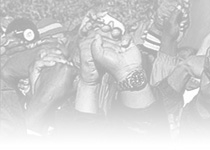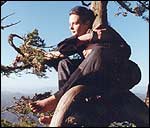|
| |
|
|
|
|
|

|
|
The Future of Marching
In the 40 years since the 1963 March on Washington, there have been marches for seemingly every cause under the sun: anti-war, anti-globalization, anti-homelessness, anti-chaos, anti-Nazi, women's rights, gay rights, voters rights, Internet programmers rights to free speech, atheists right not to believe in God — the list goes on. And in the age of the Internet, with people signing petitions and emailing donations to their congressman or woman, P.O.V. wondered: Do politicians listen to protesters? Does anybody listen? Does marching still make a difference? We asked some organizers if they think marching on Washington is
old news or still worthwhile. Here's what they had to say. |
||||

|
|
Patricia Ireland,
former president of NOW: It's certainly a very important organizing vehicle. If politicians now argue that they perhaps pay less attention to people marching in the streets, they do know that every person we put in the streets is now part of our list. They are emotionally and financially invested in a movement. In order to get a large march, you have to have people at the local level signing people up and getting contributions to pay for a bus. They sign their support, they get to know their local newspapers. |
||||

|
|
Stephanie Damoff,
women in black: street protests are still important. it is very important to speak up and web petitions are silent. too many people are silent and resigned to owerlessness. we vigil in silence, but our presence is our way of making our statement, of saying 'no'. the only thing we can do is say 'no', over and over. women in black groups are doing this all over the country, all over the world. our weekly vigils are rather small in scope, but the general response we get from passersby is one of support. |
||||

|
|
Julia Hill, former tree-sitter |
||||

|
|
Eli Pariser, Moveon.org
Director: Marching on Washington can still be an important strategy for getting heard on Capitol Hill. But these days it serves more powerfully as a signifier of the movement than as a way of putting direct pressure on Congress or the President. For people across the country who share the marchers' viewpoints, a march can signal that they are not alone — that there is a broad and visible agitation for change. New communications media allow folks to stay home and have great impact on their elected representatives. They also allow people an easy way to get involved — much easier than trekking to Washington, DC. But as an experience, writing an email doesn't compare to joining thousands of like-minded people. Executed well, a march can energize people for months and inspire them for years. |
||||
|
|